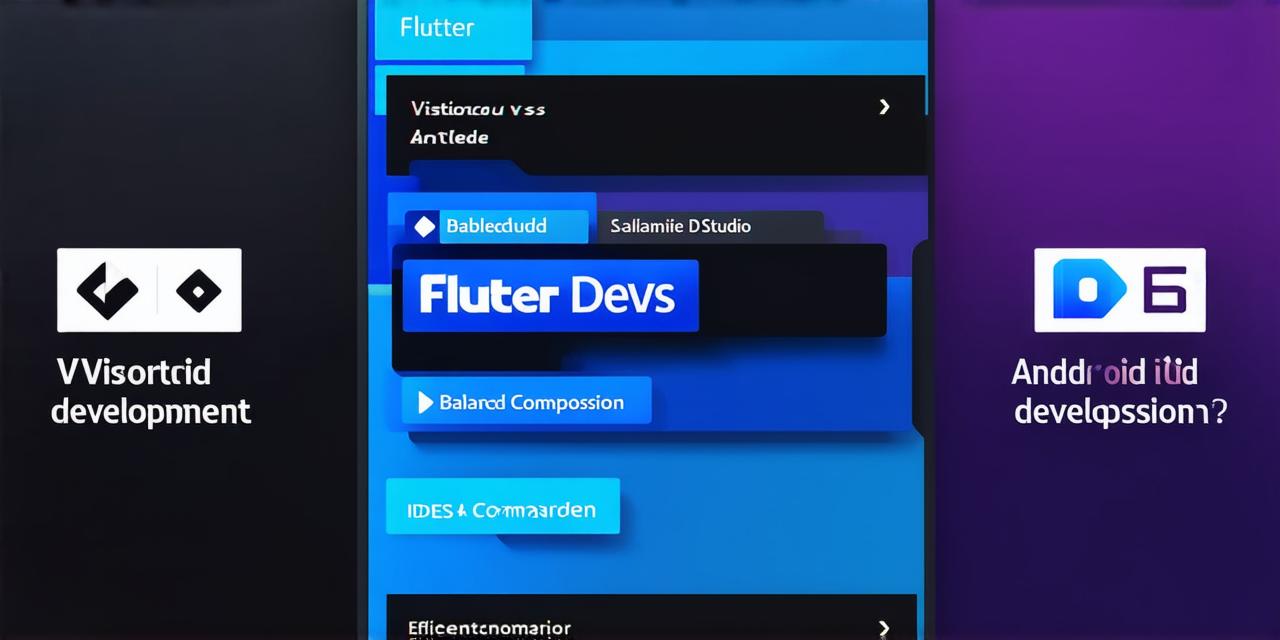If you’re an <android studio> developer considering making the switch to Flutter development, you may be wondering which integrated development environment (IDE) would be more suitable for your needs. In this article, we will explore the pros and cons of using <visual studio code (vs code)> versus <android studio> for Flutter development and help you make an informed decision based on your specific requirements and preferences.
Introduction
<Flutter/> is a popular cross-platform mobile development framework that allows developers to build applications for both iOS and Android using a single codebase. One of the key advantages of Flutter is its ability to leverage the strengths of different programming languages, such as Dart for the backend and Kotlin or Swift for the frontend. However, choosing the right IDE for your Flutter development journey can be challenging, especially if you’re already familiar with <android studio>.

Visual Studio Code (VS Code)
VS Code is a free and open-source code editor developed by Microsoft that supports multiple programming languages and frameworks, including Flutter. One of the key advantages of VS Code is its lightweight design, which makes it easy to use and navigate, even on less powerful machines. Additionally, VS Code offers a wide range of extensions and plugins that can enhance your development experience, such as debugging tools, code snippets, and syntax highlighting.
Some of the key features of VS Code for Flutter development include:
<IntelliSense support: VS Code provides real-time code suggestions and error checking to help you write cleaner and more efficient code.><Dart-specific extensions: VS Code offers a number of extensions specifically designed for Dart developers, such as the Dart Code Lenses extension, which allows you to quickly access frequently used commands and features.><Integration with Flutter tools: VS Code can be easily integrated with popular Flutter development tools, such as <android studio>, to provide a seamless development experience.><Cross-platform compatibility: VS Code runs on Windows, macOS, and Linux, making it accessible to developers working on different operating systems.>
While VS Code is a powerful and flexible IDE, there are some limitations that you should be aware of when considering it for Flutter development. One of the main drawbacks of VS Code is its lack of native support for <android studio> features, such as debugging tools and project management. Additionally, VS Code’s performance may be slower than <android studio> on more powerful machines, which can be a concern for developers working with large codebases or complex projects.
<Android Studio>
<Android Studio> is the official IDE for Android development, and it also supports Flutter development. One of the key advantages of <android studio> is its native support for Android features, such as debugging tools and project management, which can make development easier and more efficient. Additionally, <android studio> offers a wide range of plugins and integrations that can enhance your development experience, such as code analysis tools and version control systems.
Some of the key features of <Android Studio> for Flutter development include:
<Native support for Flutter: <android studio> provides native support for Flutter development, including debugging tools, project management, and integration with Flutter-specific plugins and extensions.><IntelliJ IDEA integration: <android studio> is built on top of the IntelliJ IDEA platform, which provides advanced features such as code analysis, refactoring, and version control.><Cross-platform compatibility: <android studio> runs on Windows, macOS, and Linux, making it accessible to developers working on different operating systems.>
While <android studio> is a powerful and feature-rich IDE, there are some limitations that you should be aware of when considering it for Flutter development. One of the main drawbacks of <android studio> is its larger size and slower performance compared to VS Code, which can be a concern for developers working with less powerful machines. Additionally, <android studio>‘s focus on Android development may make it less suitable for developers who prefer cross-platform development or who are more comfortable with Dart programming language.
Factors to Consider When Choosing an IDE
When choosing between VS Code and <android studio> for Flutter development, there are several factors that you should consider, including:
<Performance: If you're working with a large codebase or complex projects, you may prefer an IDE that offers faster performance and better resource management.><IntelliJ IDEA integration: If you're already familiar with IntelliJ IDEA and prefer its features, <android studio> may be the better choice for you.><Native support for Android features: If you're working exclusively on Android development or prefer to leverage the strengths of the Android ecosystem, <android studio> may be the better choice for you.><Cross-platform compatibility: If you need to work on multiple operating systems or prefer a more flexible development environment, VS Code may be the better choice for you.><Personal preferences: Ultimately, the best IDE for you will depend on your personal preferences and needs. Consider factors such as ease of use, interface design, and plugin availability when making your decision.>
FAQs
Can VS Code and <android studio> be integrated with each other?
<Yes, both VS Code and <android studio> can be easily integrated with each other to provide a seamless development experience.>
Is there any performance difference between VS Code and <android studio>?
<Yes, VS Code is generally considered to be faster and more lightweight than <android studio>, which can be an advantage for developers working on less powerful machines.>
Can I use Dart with <android studio>?
<Yes, <android studio> provides native support for Flutter development, including debugging tools, project management, and integration with Dart programming language.>
Is there any free alternative to VS Code for Flutter development?
<Yes, there are several free alternatives to VS Code for Flutter development, such as Visual Paradigm, Spyder, and Eclipse with the Flutter plugin installed.>
Conclusion
<In conclusion, choosing between VS Code and <android studio> for Flutter development depends on your specific needs and preferences. Both IDEs have their strengths and weaknesses, so it's important to consider factors such as performance, integration, and personal preference when making a decision. Ultimately, the best IDE for you will depend on your unique situation and requirements.>
